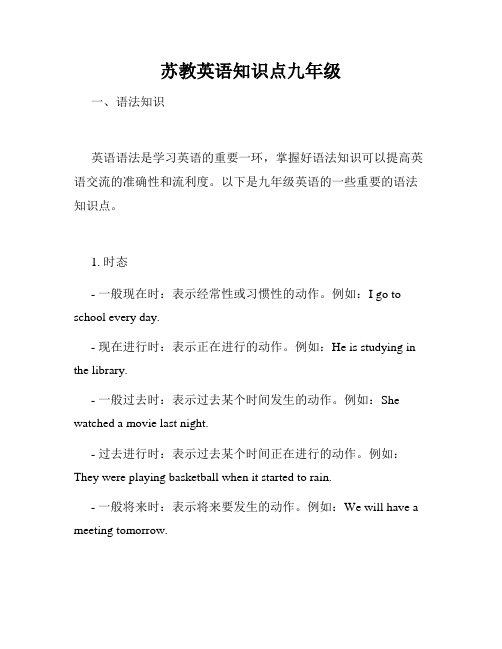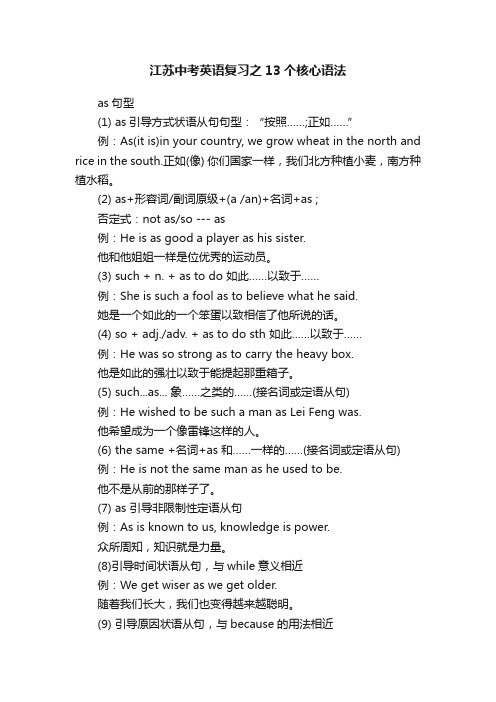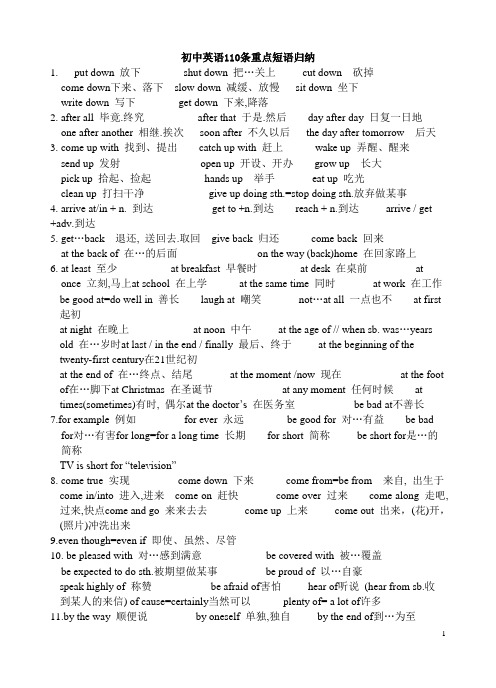江苏中考英语复习之初三重点语法汇总
苏教英语知识点九年级

苏教英语知识点九年级一、语法知识英语语法是学习英语的重要一环,掌握好语法知识可以提高英语交流的准确性和流利度。
以下是九年级英语的一些重要的语法知识点。
1. 时态- 一般现在时:表示经常性或习惯性的动作。
例如:I go to school every day.- 现在进行时:表示正在进行的动作。
例如:He is studying in the library.- 一般过去时:表示过去某个时间发生的动作。
例如:She watched a movie last night.- 过去进行时:表示过去某个时间正在进行的动作。
例如:They were playing basketball when it started to rain.- 一般将来时:表示将来要发生的动作。
例如:We will have a meeting tomorrow.- 定语从句:用来修饰名词的从句。
例如:The book that I borrowed from the library is very interesting.- 宾语从句:作为动词宾语的从句。
例如:He said that he would come to the party.- 状语从句:作为句子中的状语的从句。
例如:She went to bed after she finished her homework.3. 语态- 主动语态:表示主语是动作的执行者。
例如:Tom eats an apple.- 被动语态:表示主语是动作的承受者。
例如:The apple is eaten by Tom.4. 虚拟语气- 虚拟条件句:表示与事实相反的假设情况。
例如:If I were rich, I would travel around the world.- 虚拟语气的用法还包括祝愿、建议等。
例如:I wish I had more free time.词汇是语言的基础,掌握好词汇量有助于提高阅读和写作的能力。
江苏中考英语复习之13个核心语法

江苏中考英语复习之13个核心语法as句型(1) as引导方式状语从句句型:“按照……;正如……”例:As(it is)in your country, we grow wheat in the north and rice in the south.正如(像) 你们国家一样,我们北方种植小麦,南方种植水稻。
(2) as+形容词/副词原级+(a /an)+名词+as ;否定式:not as/so --- as例:He is as good a player as his sister.他和他姐姐一样是位优秀的运动员。
(3) such + n. + as to do 如此……以致于……例:She is such a fool as to believe what he said.她是一个如此的一个笨蛋以致相信了他所说的话。
(4) so + adj./adv. + as to do sth 如此……以致于……例:He was so strong as to carry the heavy box.他是如此的强壮以致于能提起那重箱子。
(5) such...as... 象……之类的……(接名词或定语从句)例:He wished to be such a man as Lei Feng was.他希望成为一个像雷锋这样的人。
(6) the same +名词+as 和……一样的……(接名词或定语从句)例:He is not the same man as he used to be.他不是从前的那样子了。
(7) as 引导非限制性定语从句例:As is known to us, knowledge is power.众所周知,知识就是力量。
(8)引导时间状语从句,与while意义相近例:We get wiser as we get older.随着我们长大,我们也变得越来越聪明。
(9) 引导原因状语从句,与because的用法相近例:As it was getting very late, we soon turned back.因为越来越迟了,所以我们不久就回来了。
江苏九年级英语知识点归纳

江苏九年级英语知识点归纳江苏九年级英语知识点繁多而杂乱,对于学生来说,整理归纳这些知识点能够更好地理解和掌握。
本文将结合不同主题进行归纳,以帮助学生更好地复习和应对考试。
一、语法知识点1. 时态和语态变化:(1)时态变化:一般现在时、一般过去时、一般将来时等。
(2)语态变化:主动语态、被动语态。
2. 句子结构:(1)简单句:主语+谓语+宾语。
(2)复合句:主从句、并列句等。
3. 从句关系:(1)定语从句:用来修饰名词或代词的从句。
(2)状语从句:用来修饰谓语或其他词组的从句。
(3)宾语从句:作为宾语的从句。
二、词汇知识点1. 同义词和反义词:(1)同义词:意义相同或相近的词语。
(2)反义词:意义相反的词语。
2. 词组和固定搭配:(1)常用短语:take care of, look forward to, as a matter of fact 等。
(2)固定搭配:make a decision, take a chance, have a conversation等。
3. 词义辨析:(1)近义词辨析:like和love, big和large等。
(2)同音词辨析:write和right, their和there等。
三、阅读技巧1. 题型分析:(1)选择题:根据题干和选项找出最正确的答案。
(2)填空题:根据上下文语境填写合适的词语。
2. 理解文章意思:阅读文章时,要注重理解文章的中心思想和作者的观点。
3. 解读生词:遇到生词要通过猜测词义或者查词典等方法尝试理解。
四、听力技巧1. 预测答案:听力题目的选项常常和听到的内容相关,可以根据情景和常识进行预测。
2. 注意关键词:听力材料中的关键词可以帮助理解和答题。
3. 听力策略:针对不同类型的题目,有对应的听力策略,如主旨题、细节题等。
五、写作技巧1. 作文结构:(1)开头:介绍文章主题或提出问题。
(2)主体:展开论述,逐点阐述观点。
(3)结尾:总结观点或提出建议。
苏州英语九年级知识点

苏州英语九年级知识点Introduction:苏州是一座历史悠久、文化璀璨的城市,同时也是中国最重要的经济、交通和旅游中心之一。
在苏州的初中九年级英语教学中,学生们将接触到各种知识点,下面将简要介绍一些重要的九年级英语知识点。
1. 语法知识点(1)时态和语态- 英语时态包括一般现在时、一般过去时、一般将来时等,学生需要掌握这些基本时态的构成和使用规则。
- 英语语态包括主动语态和被动语态,学生需要理解被动语态的结构和用法。
(2)从句- 学生需要了解宾语从句、主语从句、定语从句和状语从句的语法结构和连接词的使用。
- 需要掌握将复杂句子转换为简单句和将简单句子转换为复杂句子的方法。
2. 词汇知识点(1)常用词汇- 学生需要掌握常见单词的拼写、读音和词义,如动词、名词、形容词等。
- 练习应用这些单词进行句子和段落的构建。
(2)短语和习惯用语- 学生需要了解常见的英语短语和习惯用语,如“take care of”、“in the meantime”等,并理解它们在语境中的正确使用。
3. 阅读理解(1)主旨和细节理解- 学生需要通过阅读短文,抓住文章的主旨和细节,将其转述或回答相关问题。
- 同时,学生需要能够理解和使用文中的关键词汇和短语。
(2)推理和判断- 学生需要通过阅读短文,进行逻辑推理和判断,以达到对文章的深入理解。
- 能够提出与文章内容相关的问题,并用自己的语言回答。
4. 写作技巧(1)写作结构和连贯性- 学生需要知道如何组织语言,使文章具有合理的结构,包括引言、中间段落和结尾。
- 学生需要使用合适的过渡词和短语,以保持文章的连贯性。
(2)写作应用- 练习写作不同类别的文章,如记叙文、说明文、议论文等,以提高学生的写作能力。
- 学生需要能够运用所学的语法知识点和词汇知识点来表达自己的观点和经历。
Conclusion:通过对苏州英语九年级知识点的介绍,我们可以看到这些知识点在英语学习中起着重要的作用。
江苏中考英语110条重点短语归纳

初中英语110条重点短语归纳1.put down 放下shut down 把…关上cut down 砍掉come down下来、落下slow down 减缓、放慢sit down 坐下write down 写下get down 下来,降落2. after all 毕竟.终究after that 于是.然后day after day 日复一日地one after another 相继.挨次soon after 不久以后the day after tomorrow 后天3. come up with 找到、提出catch up with 赶上wake up 弄醒、醒来send up 发射open up 开设、开办grow up 长大pick up 拾起、捡起hands up 举手eat up 吃光clean up 打扫干净give up doing sth.=stop doing sth.放弃做某事4. arrive at/in + n. 到达get to +n.到达reach + n.到达arrive / get+adv.到达5. get…back 退还, 送回去.取回give back 归还come back 回来at the back of 在…的后面on the way (back)home 在回家路上6. at least 至少at breakfast 早餐时at desk 在桌前at once 立刻,马上at school 在上学at the same time 同时at work 在工作be good at=do well in 善长laugh at 嘲笑not…at all 一点也不at first 起初at night 在晚上at noon 中午at the age of // when sb. was…years old 在…岁时at last / in the end / finally 最后、终于at the beginning of the twenty-first century在21世纪初at the end of 在…终点、结尾at the moment /now 现在at the foot of在…脚下at Christmas 在圣诞节at any moment 任何时候at times(sometimes)有时, 偶尔at the doctor’s在医务室be bad at不善长7.for example 例如for ever 永远be good for 对…有益be bad for对…有害for long=for a long time 长期for short 简称be short for是…的简称TV is short for “television”8. come true 实现come down 下来come from=be from 来自, 出生于come in/into 进入,进来come on 赶快come over 过来come along 走吧,过来,快点come and go 来来去去come up 上来come out 出来,(花)开,(照片)冲洗出来9.even though=even if 即使、虽然、尽管10. be pleased with 对…感到满意be covered with 被…覆盖be expected to do sth.被期望做某事be proud of 以…自豪speak highly of 称赞be afraid of害怕hear of听说(hear from sb.收到某人的来信) of cause=certainly当然可以plenty of= a lot of许多11.by the way 顺便说by oneself 单独,独自by the end of到…为至by the time (引起时间状语从句) 到…的时候one by one依次by air / plane 乘飞机by bus / train / car 乘公共汽车/ 火车/轿车(catch a bus赶公交车get on / off the bus上/下车take a bus to…=go to …by bus乘车去) 12.do / try one’s best尽力do one’s homework做家庭作业do (the/some) shopping 购物do the cooking 烹饪do some cleaning 打扫do the / some washing洗衣服do sport做运动do with sb / sth.处理well done干得好13.early in the morning 一大早in the early spring 初春in my early days 我幼年时期early bus 早班车14.make a contribution to 贡献给、捐献make a telephone call to sb. /ring sb. up /give sb. a call /phone sb. 给某人打电话connect…to…把…与…连接起来be close to 靠近(某地)give birth to生(孩子) lose to sb输给sb .15.either…or…或者…或者.. on either side of the stree t街道任何一边(on each side of the street 街道每一边on both sides of the street街道两边)16.keep doing sth.不停地做某事(表示状态继续) keep on doing sth. 坚持做某事(表示动作反复进行) practise doing sth. 练习做某事enjoy doing sth. 喜欢做某事finish doing sth.做完某事go on doing sth.继续做某事(同一件事)17.go on to do sth.接着做某事(另一事) go straight along 沿着…一直往前走go down下降, go for a walk散, go over复习go shopping买东西, go to the cinema去看电影go well进展顺利, go off to 动身前往, go out外出, go to work去上班, go up上升,want a go 想试一试18. think about 考虑(think of 认为、想起、考虑、想到think over 仔细考虑think out 想出)talk about 谈论, worry about 担心, How / What about…?…怎么样?19.borrow…from …从…借…. (lend…to…把…借给…) from door to door 挨家挨,from time to time 时时from now on 从今以后from then on 从那以后be different from与…不同learn…from…向…学习20.get dressed 穿衣get into进入get / be lost丢失get off / on下/上车get on well with sb. 与某人相处得好get out of从…出来get ready for +n.为…做准备get ready to do sth.准备做某事get / go to sleep (fall asleep) 入睡(be asleep睡着) get warm 变暧get well康复get a chance 有机会、得到机会21. look for 寻找wait for 等候look after=take care of照看look like看起来像look over 检查,复习look out 小心,从里向外看look the same 看起来一样look up 向上看,查单词, look around 环视look forward to 期望look through 温习,检查22. set off 出发、动身put off 推迟keep off 避开、不靠近…drop off 放下(某物)turn off 关jump off 跳离, take off 脱(衣) (飞机)起飞23. half a kilo 半千克half an hour 半小时in half 分成两半half of the day 半天24. do eye exercises 做眼保健操do morning exercises 做早操take (more) exercise (多)参加体育锻炼an exercise book 练习本25. take part in 参加hand in 上交in hospital 住院in surprise 吃惊地in the sun 在阳光下in trouble 处于困境in a minute / moment 马上26. leave for…动身去某地27 feed on 以…为主食live on 继续活着base on 以…为根据carry on 坚持、继续下去and so on 等等on the other hand 另一方面on foot 步行28. be famous for 以..著名be excited about +n./V-ing 对…感到兴奋be interested in 对…感兴趣be born出生be busy with sth.— be busy doing sth. 忙于…be amazed at 对..感到惊讶29. move away 移开move to (搬)移到30. search the Internet上网31. make sure 确信make a dialogue 编对话make a mistake 犯错误by mistake 由于疏忽make a noise 吵闹make faces 做鬼脸make friends (with) 和..交朋友make room for 给..让地方make tea 沏茶make money 赚钱make a decision作出决定ed to do sth 过去常常做某事be used to doing sth. 习惯于做某事33. leave sth+介词短语“把……忘记在某处”34.forget to do sth. 忘记做某事encourage sb. to do sth. 鼓励某人做某事decide to do sth.决定做某事allow sb. to do sth. 允许某人做某事35.hear sb. to do (doing)sth. 听见某人做某事36.help sb. (to) do sth .//help sb. with sth. 帮助某人做某事with one’s help在某人的帮助下with pleasure 乐意37.the summer holiday(s) 暑假the winter holiday(s)寒假38.step into 走进pour into 倒入…39.in the first 第一for the first time 第一次at first起初 a firs t language 母语first of all 首先40. leave a message for sb. 给某人留条give / take sb. a message 给某人捎口信41. take photos / pictures 照像take away拿走take out取出work out 算出take care 当心take medicine 服药take one’s temperature量体温take one’s time别着急take a walk 散步take place 发生42. learn by oneself / teach oneself 自学learn by heart 背熟43. a year and a half (one and a half years ) 一年半44. have a try 尝试,努力try out 尝试、试验find out / about 找出,查明have a good / wonderful / great / time 玩得开心have a (bad) cold (重)感冒have a meeting / walk / watch 开会/散步/比赛have sports 进行体育活动have nothing / sth. to do with 与..无(有)关have no idea 不知道have (one’s) medicine服药45. offer sb sth. 某人提供某物46.win first prize 获一等奖47.all over the world= around the world =throughout the world 全世界48. all kinds of 各种各样的49. neither…nor 既不…也不….50. not only …but also …不但…而且, both…and ……和…都51. the more , the better 越多越好52. all one’s life 一生53. as soon as 一…就…as soon as possible 尽可能早地、尽快as well = too 也as much as 至多as little as 至少regard …as 把…当作…as if 好像54. no matter 无论…55 ever since 从那以后,此后一直56.so far 到目前为止or so大约57. another two hours (=two more hours ) 又(再) 2个小时58. three times a week 一周三次59. the number of …的数量 a (large / good) number of / large numbers of / many 许多60.less than 少于less and less 越来越少61.…is another way of saying …什么是..的另一说法Quick is another way of saying fast. Bike is short for bicycle.62. not…until…直到…才…63.be like像feel like +n./V-ing 想要like best 最喜欢would like to 想要64.the 24 hour clock 24小时制65.wash away 冲走run away逃跑take away 带走66.before long 不久long before / ago 很久以前for long =for a long time 长期no longer = not. .any longer 不再67.more or less = about 或多或少大约more than = over 多于,超过68.every year 每年every four years 每隔四年every other day 每隔一天everyday English / life 日常英语/生活69. next to 紧挨着next door 隔壁,邻居next year 明年next time 下次70.receive / get / have a letter from sb. = hear from sb 收到某人的来信71.on show = on display 展览72.be filled with / be full of 充满…73. thank to =because of 由于74.some day =one day (将来)某一天all day 终日day and night 日日夜夜in a day or two 一两天内in the old days 从前,旧社会from day to day (day after day)日复一日the day before yesterday 前天the day after tomorrow 后天Tree Planting Day植树节Women’s Day 妇女节75. keep / stop / prevent…(from) doing sth. 防止(阻止)…做某事stop to do sth.停下来去做某事stop doing sth.停止做某事76.nice and +adj. = very +adj.很,非常77. a place (places) of interest 名胜78.three quarters of the information on the Internet 因特网上四分之三的信息two thirds of the books三分之二的书79. credit card 信用卡80. the increasing population 增长着的人口81 a path of travel 旅行路线82. point at / to 指向83. by sea = by ship 乘船by the sea = on the sea 在海边at sea在海上84. set one’s mind to do sth.一心想做某事85 .multiply…by…乘以…86. See you! 再见You see. 你知道你明白, 你瞧Let mesee.让我想想see sb. Off 给某人送行see a / the doctor 看病see sb . do / doing sth. 看见某人做某事87 some…others 一些(人,物)…其他(人,物) one…another一个..另一个(三者或以上) one…the other一个…另一个(总数二个)88. be worn out 穿旧,磨坏check out 核实,检查write out 写出take sth. out of 从…拿出/取出某物89. in this way 用这种方法in a few year’s time几年以后in space 在太空in and out of class 在课内课外in the last fifteen minutes 在最后十五分钟里in the second half 在下半场later in one’s life在某人后半身in the air 在空中in the open air 在户外90.give sb. an injection 给某人打针get an injection打针91.have been to 去过某地have gone to 到某地去了92.here + be+ 名词+ for+某人( Here is a letter for you. 这儿有你的一封信.)93.be far behind +某人(He is far behind others. 他落后于别人)94. one of + adj.最高级+复数名词95. take +某物+with +某人(You’d better take an umbrella with you.你最好带上雨伞)96. prefer to= like…better than宁愿,更喜欢prefer + V-ing (to do sth.) ( I prefer doing (to do) it myself .我喜欢自己做那件事).Would / should等情态动词+ prefer +不定式. (I would prefer to do it myself.我宁愿自己做那件事) , prefer +名词(v-ing) + to+名词(v-ing) (I prefer learning English to playing football.我愿意学英语而不愿踢足球) ;prefer +不定式(名词)+ rather than + 不带to的不定式, (I prefer to walk there rather than go by bus.我喜欢走着去那里,而不愿乘车) ,prefer + 名词(代词) to do sth. (We prefer her not to come.我们宁愿她不来)97. 人+ spend +time (money) +(in) doing sth. (I spent over two hours (in) finishing my homework. 我花了两个多小时完成家庭作业.) , 人+ spend + time (money) + on +名词, (He spent 1,000 on the TV set .他花了一千元买电视机). 人+ pay + money +for +sth. ( He p aid ten yuan for the book .他花了10元钱买那本书.) It + takes (will take, / took…) + sb. + time (money) + to do sth. (It’ll take you only ten minutes to get there by bus.乘车去那里只花你10分钟). 物+ cost + (sb.) + money, (The dictionary cost me 20 yuan .我花20元钱买了那本词典)98. do with + sb. / sth. (What have you done with the pork ? 那些肉你怎么处理了?)99. mind + if 从句, (Do you mind if I open the window?我开窗你不反对吧?) mind +V-ing, (Would you mind turning on the TV?打开电视你不反对吧?)100. what…for? / why…? (What do you learn English for? = Why do you learn English?) 101. need + 名词(v-ing), (The students need some help.学生们需要帮助.This pair of shoes needs mending.这双鞋需要修理)102. “be used for+ 名词(v-ing),”被用来做.. (A writing brush is used for writing.) “be used as+名词”, 被作为…使用(English is used as the first language in none of these countries. ) “be used by+动作执行者”, 被…使用,103.be made of 由…制造(This table is made of wood .这张课桌是木制的) be made from由…制成(This kind of paper is made from wood . 这种纸是用木材制成的)be made in+地点, “某地制造”(These cars are made in Germany)be made by+人, “由谁制造的” (This kite is made by Kate . )104. more developed countries 发达国家less developed countries 不发达国家developing countries 发展中国家105.be worth + money (V-ing), 值…钱.值得做…This car is worth more than two million yuan in China. This book is well worth reading.这本书很值得一读.106. the Summer Palace 颐和园Tian’anmen Square天安门广场the Palace Museum 故宫the Great Hall of the People 人民大会堂the Temple of Heaven 天坛the Great Green Wall 绿色长城PLA 中国人民解放军PRC 中华人民共和国the Party 中国共产党the League 共青团Peking Opera 京剧107 a digital camera 数字照相机 a doctor for animals = an animal doctor 动物医生108. so + 形/副+that 从句(The place is so cold that nothing can grow in winter.这地方太冷,冬天什么都不长) so + many / few+ 复数名词+that从句(He has so many books that I don’t know which one to borrow. 他有那么多书,我不知道借哪一本) so + much / little+ 不可数名词+that从句(She has so little money that she can’t buy anything .她钱太少,什么也买不到.)so+ 形容词+a / an +单数名词+that从句(This is so good a book that all of us like reading it ) , such +a / an+ 形容词+单数名词+ that从句(This is such an interesting story that all of us like it) , such +形容词+复数名词+that从句. such +形容词+不可数名词+that 从句(It is such fine weather today that many children are playing outside)109 .tell sb about sth. 告诉某人关于某事tell sb+从句tell sb. to do sth.让某人做某事tell a lie 说谎tell a story 讲故事thank you for +n ./V-ing 谢谢你…too +adj. / adv. + to + v.太…而不能too much (修饰名词)太多,过分much too(修饰adj./adv.)太110. hope / wish+不定式(或从句),wish sb. to do sth. What do you mean by…?= What does…mean?…是什么意思?(From:)。
苏教版初三语法重难点整理

苏教版初三语法重难点整理词性标注标点符号:标点符号是标点语调和表示语法关系的符号。
包括:句号“。
”、逗号“,”、问号“?”、感叹号“!”、冒号“:”、引号“‘’”,等等。
代词:代词是用来代替名词的词语。
例如:我、你、他、它、她、我们、你们、他们等。
冠词:冠词是用于名词前的限定词,包括不定冠词“a”、“an”和定冠词“the”。
形容词:形容词是用来描述、修饰名词或代词的词语。
例如:大、小、高、低、美丽、聪明等。
副词:副词是用来修饰动词、形容词、副词和整个句子的词语。
例如:非常、很、快、慢、不等、不常等。
数词:数词是用来表示数量的词语。
例如:一、两、三、十、百、千、万等。
时态和语态时态:时态是指动词所表示的动作或状态发生的时间。
主要有:一般现在时、一般过去时、一般将来时等。
语态:语态是指动词所表达的动作或状态与主语的关系。
主要有:主动语态和被动语态。
主动语态表示主语是动作的执行者,而被动语态表示主语是动作的承受者。
主谓一致主谓一致是指主语和谓语在人称和数上保持一致。
主要有以下几种情况:- 当主语是第三人称单数时,谓语动词要用单数形式。
- 当主语是第三人称复数或第一、第二人称时,谓语动词要用复数形式。
- 当主语是由and连接的两个或两个以上的名词时,谓语动词要用复数形式。
动词时态语态的使用一般现在时:表示经常性或习惯性的动作、状态,或客观真理等。
通常与表示频度的副词连用,例如:always、often、usually等。
一般过去时:表示过去某个时间发生的动作,或过去的习惯等。
一般将来时:表示将来的动作或状态。
被动语态:当我们不知道或不关心动作的执行者时,或者强调动作的承受者时,可以使用被动语态。
倒装句部分倒装:将助动词或情态动词放在句首的句子形式,常用于否定词或表示“只有”“无论”等引导的句子中。
例如:Not only did he study hard, but he also got the highest score in the class.完全倒装:将句子的谓语动词全部提前至主语之前的句子形式,常用于表示祝愿、建议、命令等陈述的句子中。
江苏九年级英语知识点

江苏九年级英语知识点一、单词与短语1. Currency(货币)- 表示货币单位:dollar(美元), pound(英镑), euro(欧元)等。
- 常用表达:currency exchange(货币兑换), currency converter(货币转换器)。
2. Geography(地理)- 表示地理位置:continent(大洲), country(国家), ocean (海洋)等。
- 常用表达:geographical features(地理特征), geography textbook(地理教材)。
3. Environment(环境)- 表示环境问题:pollution(污染), deforestation(森林砍伐), climate change(气候变化)等。
- 常用表达:environmental protection(环保), environmental awareness(环境意识)。
4. Technology(科技)- 表示科技设备:computer(电脑), smartphone(智能手机), tablet(平板电脑)等。
- 常用表达:technological advancements(科技进步), technological innovation(技术创新)。
5. Education(教育)- 表示教育领域:school(学校), teacher(教师), student(学生)等。
- 常用表达:educational system(教育体系), educational policy(教育政策)。
6. Communication(交流)- 表示交流方式:email(电子邮件), social media(社交媒体), video call(视频通话)等。
- 常用表达:effective communication(有效沟通), communication skills(沟通技巧)。
九年级英语苏教版知识点

九年级英语苏教版知识点英语是全世界通用的语言之一,在现代社会中掌握好英语可以为我们的学习、工作和生活带来巨大的便利。
下面是九年级英语苏教版教材中的一些重要知识点,希望对大家的学习有所帮助。
一、时态和语态1. 一般现在时:表示经常性、习惯性的动作或真理等。
例句:I often go to school by bus.2. 现在进行时:表示现阶段正在进行的动作。
例句:He is watching TV now.3. 一般过去时:表示发生在过去某个时间的动作或状态。
例句:They went to the park last weekend.4. 过去进行时:表示过去某个时间正在进行的动作。
例句:She was reading a book at 8 o'clock yesterday.5. 一般将来时:表示将来某个时间要发生的动作或情况。
例句:We will have a party next week.6. 被动语态:表示主语是动作的承受者。
例句:The book was written by him.二、语法知识1. 定冠词和不定冠词的用法。
例句:A dog is an animal. The dog is barking.2. 形容词和副词的比较级和最高级。
例句:He is taller than his brother. He is the tallest boy in the class.3. 直接引语和间接引语的转换。
例句:He said, "I like English." → He said that he liked English. 4. 祈使句的用法。
例句:Close the door, please.5. 定语从句的引导词和用法。
例句:The book which I lent you is very interesting.三、阅读技巧1. 根据文章的标题和开头段落推测文章的大意。
- 1、下载文档前请自行甄别文档内容的完整性,平台不提供额外的编辑、内容补充、找答案等附加服务。
- 2、"仅部分预览"的文档,不可在线预览部分如存在完整性等问题,可反馈申请退款(可完整预览的文档不适用该条件!)。
- 3、如文档侵犯您的权益,请联系客服反馈,我们会尽快为您处理(人工客服工作时间:9:00-18:30)。
一. 宾语从句1. 宾语从句的含义在整个句子中做宾语的从句叫做宾语从句。
如:She knew that the teacher had seen the film.她知道这位老师看过这部电影。
(“that the teacher had seen the film”做knew 的宾语,同时又是由连接词that 引导的从句,所以它叫做宾语从句。
)2. 宾语从句的分类(1)动词宾语从句:顾名思义,它是位于动词后面的宾语从句。
例如:He asked whose handwriting was the best in our class.他问我们班上谁的书法最好。
(2)介词宾语从句:顾名思义,它是位于介词后面的宾语从句。
例如:I agree with what you said just now.我同意你刚才说的话。
(3)形容词宾语从句:顾名思义,它是位于形容词后面的宾语从句。
例如:I am afraid that I will be late. 恐怕我要迟到了。
3. 引导名词性从句的连接词(1)that:没有含义,在宾语从句中不做成分(2)whether/if:表示是否,在宾语从句中不做成分。
I don't know if /whether he still lives here after so many years. 我不知道这么多年后,他是否还住在这里。
(3)连接代词:what, which, who, whom, whose(在宾语从句中做主、宾、表和定语)连接副词:where, when, how, why(在宾语从句中做状语)The small children don't know what is in their stockings.(what 在宾语从句中做主语)这些小孩子不知道什么在他们的长筒袜里。
Could you tell me why you were late for the meeting this morning?(why 在宾语从句中做原因状语)你能告诉我为什么你今天早上开会迟到吗?4. 在做宾语从句的题目时应注意两点(1)时态①当主句是现在时态时,宾语从句可以根据需要使用任何时态。
I don't know when he will come back.我不知道他将何时回来。
He tells me that his sister came back yesterday.他告诉我他姐姐昨天回来了。
②当主句是过去时态时,宾语从句必须是一种过去的时态。
She asked me if I knew whose pen it was.她问我是否知道这是谁的钢笔。
He said that he could finish his work before supper.他说他会在晚饭前完成工作。
③当表示客观事实或普遍真理的句子做宾语从句时,任何时候都用一般现在时。
The teacher said that the earth goes round the sun.老师说过地球绕着太阳转。
(2)语序任何从句都使用陈述句语序,宾语从句当然也不例外。
二. 定语从句1. 定语从句的概念在复合句中,修饰某一名词或代词的从句叫定语从句。
被修饰的名词或代词叫先行词,引导定语从句的词叫关系词,定语从句一般放在先行词的后面。
2. 定语从句的关系词引导定语从句的关系词有关系代词和关系副词,常见的关系代词包括that,which,who(宾格whom,所有格whose)等,关系副词包括where,when,why等。
关系代词和关系副词放在先行词及定语从句之间起连接作用,同时又作定语从句的重要成分。
3. 定语从句的分类根据定语从句与先行词的关系,定语从句可分为限制性定语从句及非限制性定语从句。
限制性定语从句紧跟先行词,主句与从句不用逗号分开,从句不可省去。
非限制性定语从句与主句之间有逗号分开,起补充说明作用,如省去,意思仍完整。
4. 关系代词的用法(1)that 既可以用于指人,也可以用于指物。
在从句中作主语、宾语或表语。
作主语时不可省略,作宾语可省略。
例如:Mary likes music that is quiet and gentle.玛丽喜欢轻柔的音乐。
(that作主语)The coat (that)I put on the desk is blue.我放在桌子上的那件外套是蓝色的。
(that作宾语)(2)which用于指物,在句中作主语、宾语或表语。
作主语不可省略,作宾语可省略。
例如:The building which stands near the train station is a supermarket.位于火车站附近的那座大楼是一家超市。
(作主语)The film (which)we saw last night was wonderful.我们昨天晚上看的那部电影很好看。
(作宾语)(3)who,whom用于指人,who 用作主语,whom用作宾语。
在口语中,有时可用who代替whom。
who和whom作宾语时也可省略。
例如:The girl who often helps me with my English is from England.经常在英语方面帮助我的那个女孩是英国人。
(作主语)Who is the teacher (whom)Li Ming is talking to?正在与李明谈话的老师是谁?(作宾语)4. 关系副词的用法(1)when指时间,其先行词表示时间,when在定语从句中作时间状语。
例如:This was the time when he arrived.这是他到达的时间。
(2)where指地点,其先行词表示地点,where在定语从句中作地点状语。
例如:This is place where he works.这是他工作的地点。
(3)why 指原因,其先行词是原因,why在定语从句中做原因状语。
例如:Nobody knows the reason why he is often late for school.没人知道他为什么上学总迟到。
三. 现在完成时1. 现在完成时的基本结构肯定句:主语+have/has+动词的过去分词+其他否定句:主语+have/has+not+动词的过去分词+其他一般疑问句:Have/Has+主语+动词的过去分词+其他特殊疑问句:特殊疑问词+一般疑问句(have/has+主语+过去分词+其他)2. 现在完成时的用法(1)现在完成时用来表示过去已经完成的动作对现在造成影响或后果。
也就是说,动作或状态发生在过去但它的影响现在还存在,强调的是现在。
I have already posted the photo.我已经邮寄出了照片。
与此种用法连用的时间状语时一些模糊的过去时间状语,如already(肯定句句中), yet (否定句/疑问句句尾), just, before, recently,still, lately,never等。
(2)现在完成时也可用来表示动作或状态发生在过去某一时刻,持续到现在并且有可能会继续持续下去。
He has lived here since 1978.自从1978年以来,他一直住在这儿。
(动作起始于1978年,一直住到现在,可能还要继续住下去。
)此种用法常与for(+时间段),since(+时间点或过去时的句子)连用。
谓语动词必须是延续性动词。
有些瞬间动词可变为延续动词:go out----be outfinish----be overopen----be opendie----be deadbuy---havefall ill---be illcome back----be backcatch a cold----have a cold3. 现在完成时常见考法对于现在完成时的考查,多以单选、句型转换或词语运用的形式考查学生在具体语境中灵活运用时态的能力。
在考试中,会让大家判断是否该用现在完成时,或者是考查“瞬间动词”不能与表示一段时间的状语连用”这一知识点。
【典型例题】His father_____the party since 1978A.joindB.has joinedC.was inD.has been in答案:D解析:本题考查学生对现在完成时的熟练掌握。
since 1978表达“自从1978年一直到现在”,表示这件事情从过去一直持续到现在,应该用现在完成时,而且动词必须是延续性动词,A、B均为瞬间动词,不能与时间段连用,故排除;C为一般过去时,也不行。
4. 比较一般过去时和现在完成时的异同(1)共同点:动作都是在过去完成。
I saw the film yesterday evening.I have seen the film before.(看电影这件事都是在过去完成的。
)(2)区别:①现在完成时强调过去发生的动作对现在的影响和结果,而一般过去时与现在没有联系,只是说明某个动作发生的时间是在过去。
②一般过去时通常与具体明确的过去时间状语连用。
如yesterday, last week , two years ago,just now,in 2002 等;而现在完成时则常与just ,already ,ever ,never 等模糊的过去时间状语和these days ,this week ,since..., for... 等表示一段时间的状语连用。
【典型例题】—______ you your homework yet ?—Yes . I _____ it a moment ago .A.Did ; do ; finishedB.Have ; done ; finishedC.Have ; done ; have finished答案:B解析:本题考查一般过去时和现在完成时的用法区别。
问句中的yet表明应该用现在完成时,而回答中的a moment ago 是一个明确的过去时间状语,应该用一般过去时。
四. 被动语态被动语态由助动词be加及物动词的过去分词构成,助动词be有时态,人称和数的变化。
被动语态的时态是由be的时态决定的,be是什么时态,全句就是什么时态,be动词后面的过去分词不变。
1. 各种时态的被动语态结构如下:一般现在时的被动语态:主语+am / is / are (not)+过去分词一般过去时的被动语态:主语+was / were +过去分词现在完成时的被动语态:主语+have / has +been +过去分词一般将来时的被动语态:主语+will +be +过去分词过去将来时的被动语态:主语+would / should + be +过去分词过去进行时的被动语态:主语+was / were + being +过去分词过去完成时的被动语态:主语+had + been +过去分词情态动词的被动语态:情态动词+be+过去分词2. 被动语态的用法(1)不知道或没有必要说明动作的执行者是谁,不用by+动作执行者短语。
